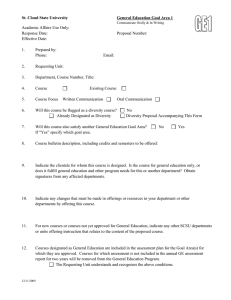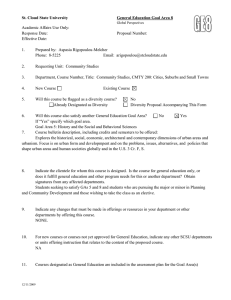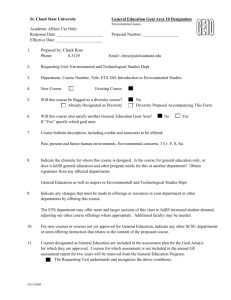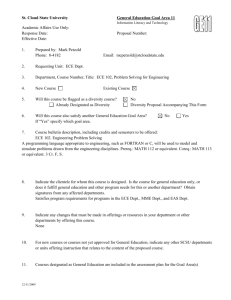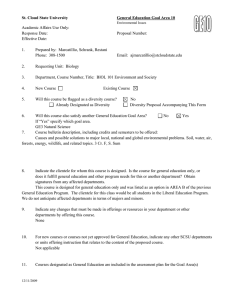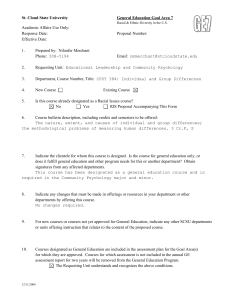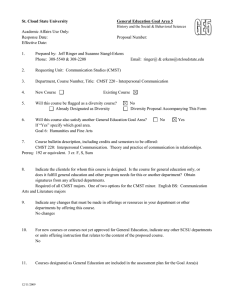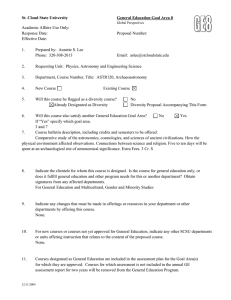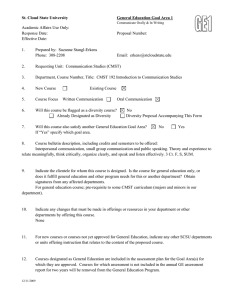St. Cloud State University General Education Goal Area 11
advertisement
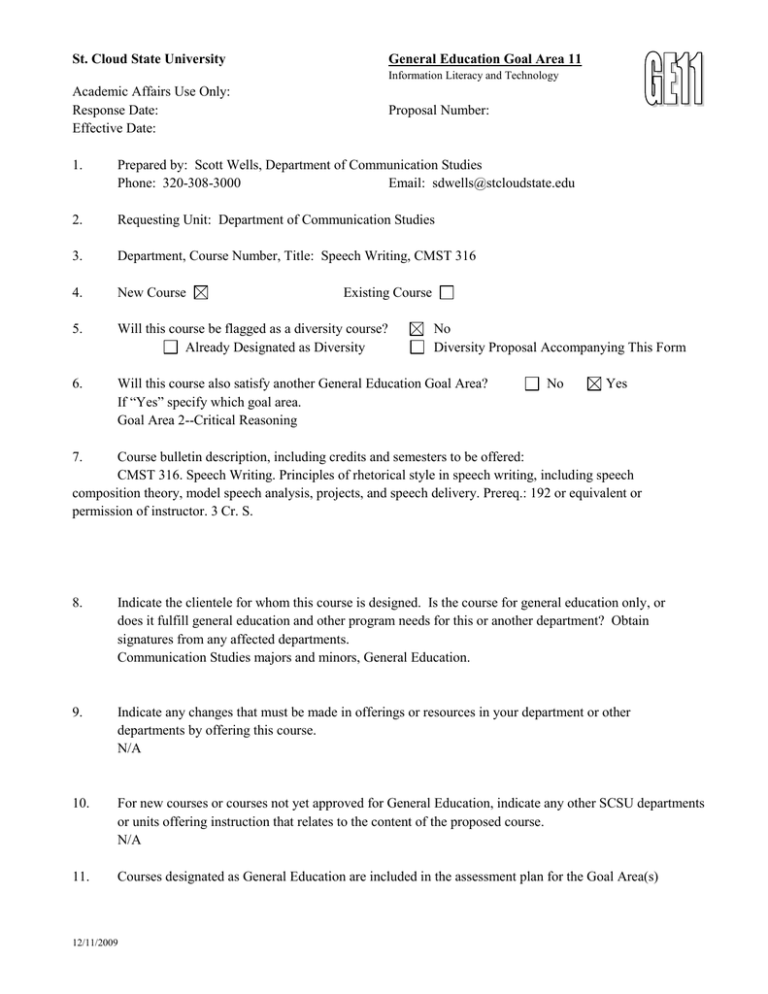
St. Cloud State University General Education Goal Area 11 Information Literacy and Technology Academic Affairs Use Only: Response Date: Effective Date: Proposal Number: 1. Prepared by: Scott Wells, Department of Communication Studies Phone: 320-308-3000 Email: sdwells@stcloudstate.edu 2. Requesting Unit: Department of Communication Studies 3. Department, Course Number, Title: Speech Writing, CMST 316 4. New Course 5. Will this course be flagged as a diversity course? Already Designated as Diversity 6. Will this course also satisfy another General Education Goal Area? If “Yes” specify which goal area. Goal Area 2--Critical Reasoning Existing Course No Diversity Proposal Accompanying This Form No Yes 7. Course bulletin description, including credits and semesters to be offered: CMST 316. Speech Writing. Principles of rhetorical style in speech writing, including speech composition theory, model speech analysis, projects, and speech delivery. Prereq.: 192 or equivalent or permission of instructor. 3 Cr. S. 8. Indicate the clientele for whom this course is designed. Is the course for general education only, or does it fulfill general education and other program needs for this or another department? Obtain signatures from any affected departments. Communication Studies majors and minors, General Education. 9. Indicate any changes that must be made in offerings or resources in your department or other departments by offering this course. N/A 10. For new courses or courses not yet approved for General Education, indicate any other SCSU departments or units offering instruction that relates to the content of the proposed course. N/A 11. Courses designated as General Education are included in the assessment plan for the Goal Area(s) 12/11/2009 for which they are approved. Courses for which assessment is not included in the annual GE assessment report for two years will be removed from the General Education Program. The Requesting Unit understands and recognizes the above conditions. 12/11/2009 12. Provide a concise explanation of how the following goal is a “significant focus” of the proposed course. Goal Area 11: Information Literacy and Technology To locate, evaluate critically, and use information to meet an identified information need and develop appropriate information technology skills. This course requires students to learn and apply advanced research skills. 13. In order for a course to be designated as fulfilling Goal Area 11, it must address 4 of the 4 student learning outcomes (SLOs) below. Check the SLOs below that are focused on in the proposed general education course. 1. Identify and analyze an information need effectively and efficiently. 2. Access information using an effective search strategy and appropriate resources. 3. Critically evaluate information and its sources in order to determine information reliability and accuracy, and discern its point of view, bias, and authority. 4. Access and use information ethically and legally. 14. Discuss how each Student Learning Outcome checked above is achieved in this course. (Note: Although descriptions of typical assignments or types of assignments may be part of this discussion, it is not appropriate to submit copies of actual assignments.) SLO 1: Students identify different types of support materials. In addition, students learn to utlize pertinent and relevant information. Finally, students differentiate between observations and inferences. SLO 2: Students learn how to use differnet advanced research methods, including searchbanks and databases. SLO 3: Students gauge the credibilty of sources. Students practice researching and critiquing the quality of evidence in various forms. SLO 4: Students learn to recognize and incoporate ethical and legal communication practices. Students identify the weaknesses and strengths in research materials and types of evidence. 15. List or attach the Course Outline (adequately described and including percentage of time to be allocated to each topic). Curriculum Committees may request additional information. Topics larger than 20% need to be broken down further. Indicate in your course outline where the Student Learning Outcomes checked above are being met. Overview of the Speech Writing Profession Oral Style Rhetorical Theory Research Strategies (Research Methods, Tests of Evidence) Rhetorical Choices in Constructing a Public Speech Argument Analysis for Public Speeches Speech Models for Style 12/11/2009 5% 10% 10% 10% 5% 10% 10% Speech Models for Composition Analysis Speech Writing Workshop Speech Delivery Workshop Evaluation and Testing 12/11/2009 10% 15% 10% 5% St. Cloud State University General Education Transmittal Form Academic Affairs Use Only: Response Date: Effective Date: Proposal Number Department: CMST Course or Course(s): Speech Writing, CMST 316 Roseanna Gaye Ross Department or Unit Chair Signature 2/05/10 Date Department forward to Academic Affairs for publication and electronically to Chair of General Education Committee, Chair of College Curriculum Committee, College Dean Recommendation of General Education Committee: Approve Remarks: Disapprove Chairperson Committee Signature Date Recommendation of University Curriculum Committee: Approve Remarks: Disapprove Chairperson Committee Signature Date Recommendation of Faculty Association: Approve Remarks: Disapprove FA Senate Signature Date Action of Academic Vice President: Approve Disapprove Signature Entered in Curriculum Data File 12/11/2009 Remarks: Date
